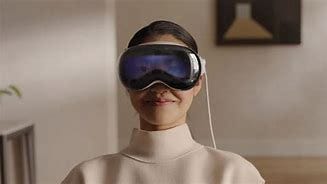Apple unveiled their first new product in almost ten years yesterday: the Apple Vision Pro, a “headset” (that’s what they call it) that allows you to do something they’re calling “spatial computing.”
The backlash has been pretty quick—people call it ugly and lament its high price tag ($3500). And that’s true. But it was also inevitable, because under CEO Tim Cook (who replaced Steve Jobs), Apple made a subtle but significant change. It was no longer a company that made new products, but a delivery service for consuming and subscribing. Tim Cook realized that Apple could make way more money from people buying things with their iPhones than by making new Apple products. Apple gets a 30% cut of all transactions made in the App Store—that’s a lot of money! And Apple gets $15 billion from Google every year to make Google the default search engine on every iPhone. Those are just two examples of the many ways that Apple uses the ubiquity of the iPhone to make billions. Apple also knew that it could just keep releasing new iPhones and people would keep buying them. So between those two things, it was set.
The new “spatial computing” goggles are just the logical endpoint of all this—it’s a way for customers to seamlessly integrate their consumption habits into their lives at a whole new level. The barrier of having to use a handset (what they call smartphones) is gone—now it’s a headset that you can just control with your eyes and a wave of your hand. You don’t need to pull out your handset and punch at a screen to spend money—now you can just do it with your eyes.
Tim Cook himself said that the new goggles are the first Apple product you “look through not at.” So you aren’t looking at anything, you’re looking through it—looking through into what? Into a world of commerce. The future of capitalism is post-product; products don’t matter anymore. Just subscriptions and services that you compulsively give your money to, and erasing the barriers between those things is what the future of capitalism will be all about.
The goggles blend virtual reality and augmented reality—it brings digital space into physical space in a whole new way. Was anyone asking for this? Not really. But we got it. Why? Because it is the acceleration of Apple’s business model of getting customers to consume in a more seamless way—think how much more you can buy if you just have to use your eyes instead of your clunky fingers.
In ten years or so, even this will be seen as inefficient at getting customers to buy things, so a new product will be designed that goes inside our heads. Elon Musk’s Neuralink company is working on something like this, and there’s no doubt that will be the future. Apple will probably be the company that rolls it out, because they have a better track record at making customer-friendly, mass market products that people trust and enjoy. (Musk makes electric cars that light on fire and rockets that explodes, so I don’t think people are going to rush to get his brain chips).
The future is here, but it’s just whatever capital wants—and capital wants more efficient consumption. That’s it. You can predict the future easily—just imagine ways in which capital can more seamlessly get money out of people, and that’s what the future will be.
These goggles have the added benefit of getting digital space to merge with physical space—so as the real conditions of life get more and more miserable and grotesque, as the masses descend into permanent poverty and wretchedness, the lucky ones who have good jobs will be able to ignore it just a bit more easily. Already in New York City one is confronted with people suffering from homelessness all the time—and you can bet that the wealthy residents of the city will want a way to block them out.
And this is another meaning of “looking through not at”—you look through the suffering, misery, and poverty all around you, not at it. People already do this now—they look through, or at least around, all the misery that piles up around them as social inequality gets worse and worse.
So that is another thing that Apple is monetizing—the tendency of its customer-base to look through the world as they see it. The world gets worse and worse, and people want to look at it less—now there is a good market opportunity!




I'll get some small comfort if and when this goes down in flames, just like Google Glass.
As for Neuralink, I have no idea how the fuck the FDA approved that bullshit for human trials.